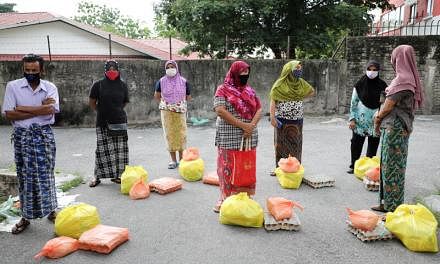BEIJING (AFP) - China said on Monday (Nov 20) that Myanmar and Bangladesh have backed its plan to resolve a crisis that has caused more than 600,000 Rohingya refugees to flee from Myanmar into Bangladesh.
Chinese foreign minister Wang Yi presented a "three-phase solution" during visits to Bangladesh last week and Myanmar this weekend.
Deadly attacks by Rohingya militants on Aug 25 sparked a massive backlash from Myanmar's security forces that the United Nations says may amount to "ethnic cleansing".
Beijing, which supported the military junta that ruled Myanmar for decades, has backed the country's current government during the crisis.
The Chinese plan starts with a ceasefire in Myanmar's Rakhine state "so that local residents can no longer be displaced".
It then moves to calls for the international community to encourage Myanmar and Bangladesh to keep up talks to find a "feasible solution" after the two nations reached an initial agreement on the repatriation of refugees.
The final phase would involve finding a long-term solution focused on poverty alleviation.
"This proposal was approved in Bangladesh by Bangladesh leaders. Yesterday (Sun), it also won approval from Myanmar leaders," Chinese foreign ministry spokesman Lu Kang told a regular news briefing.
"We hope that Foreign Minister Wang Yi's proposal will not only help to resolve the current Rohingya crisis, but also more importantly will contribute to fundamentally addressing the issue," Lu said.
Bangladesh and Myanmar have agreed in principle to begin repatriation of the Rohingya but are still tussling over the details.
Some 620,000 Rohingya have fled rape, murder and arson in Myanmar, where the Muslim minority are viewed as illegal immigrants from Bangladesh.
Wang was still in Myanmar on Monday to participate in a meeting of Asian and European foreign ministers.











